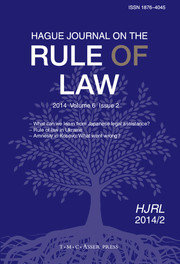Article contents
A Peek under the Engine Hood: The Methodology of Subnational Economic Governance Indices
Published online by Cambridge University Press: 30 September 2011
Abstract
In recent years, The Asia Foundation (The Foundation) has conducted a series of Economic Governance Indexes (EGIs) in countries throughout South and Southeast Asia including Bangladesh, Sri Lanka, Vietnam, Cambodia, and Indonesia. EGIs are country-specific diagnostic tools used to assess and rank sub-national units (provinces, states, districts, etc.) on various aspects of their regulatory environments.
This article reviews the basic theoretical and programmatic rationale for the EGI. The overall rationale for this tool stems from the idea that economic governance impacts private sector development – independent of structural endowments such as location, infrastructure, and human capital. Therefore, good economic governance practices explain why some sub-national units out-perform others in spite of having similar initial endowments. EGIs have become an important tool to provide relevant economic governance information to policy makers, business leaders and citizens. Examining the methodological principles underlying the index approach, this article also describes how the three primary EGI methodological elements anticipate potential pitfalls and how they have been addressed within the methodology.
Keywords
- Type
- Articles
- Information
- Copyright
- Copyright © T.M.C. Asser Press and the Authors 2011
- 5
- Cited by


